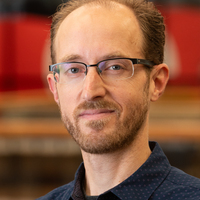Papers by Steve Graby

Neurodiversity: bridging the gap between the disabled people’s movement and the mental health system survivors’ movement?
Madness, Distress and the Politics of Disablement, 2015
Chapter in the book 'Madness, Distress and the Politics of Disablement' edited by... more Chapter in the book 'Madness, Distress and the Politics of Disablement' edited by Spandler, Anderson & Sapey, 2015, Policy Press, pp.231-243 This chapter traces the origins and evolution of the neurodiversity movement, which consists of people with conditions (such as autistic spectrum 'disorders', AD(H)D, dyspraxia, dyslexia, etc.) which have been positioned somewhere in between the traditional categories of 'disability' and 'mental illness'. The neurodiversity movement has roots in, and, as will be argued, has new insights to offer to, both the disabled people's and survivor movements; thus it should be of interest for those seeking to bridge conceptual gaps between the disabled people’s and survivor movements - such as the sticking point between them over the concept of 'impairment' (Plumb 1994). Writers and activists within the neurodiversity movement are acutely aware of and concerned with the social construction of both 'distress' and 'disability', and have developed their own distinct analysis of these concepts. This chapter gives an overview of some of that thinking. It draws on my own experience within the neurodiversity movement, as well as on published literature from all three movements, to illustrate the convergences and divergences between them, and finally offers some suggestions for ways forward...
Disability & Society, 2019
The recent financial collapse of Northamptonshire County Council sets a worrying precedent for lo... more The recent financial collapse of Northamptonshire County Council sets a worrying precedent for local authorities in the United Kingdom, and in particular for disabled people who depend on services provided by local authorities, such as Direct Payments for personal assistance, for their daily living needs. While the Northamptonshire situation has been blamed on financial incompetence, we argue that it has deeper roots in austerity policies implemented by Conservative-led governments since 2010 on a national level. We also argue that the placement of responsibility for funding personal assistance services in the hands of local authorities creates a deeply unjust 'postcode lottery' for disabled people, and we call for a national right to all services necessary for independent living, regardless of cost.

Disability & Society, 2018
This article explores the definition of Critical Autism Studies and its inclusion in autistic sch... more This article explores the definition of Critical Autism Studies and its inclusion in autistic scholarship. There has been critique of recent non-autistic literature for lacking autistic authorship, leading to doubts about its epistemological integrity due to misrepresentations of autistic culture and the neurodiversity movement. This article utilises the work of Arnold, Milton and O'Dell et al. to introduce an emancipatory definition to ensure the discipline is autistic led. In the process, we discuss the nature of autism studies and what constitutes critical literature. We propose Waltz's interpretation of Critical Autism Studies as a working definition. What is Critical Autism Studies? Critical Autism Studies (CAS) has come a long way since Jim Sinclair's ([1993] 2012) seminal speech with autistic activist-academics critiquing the deficit-laden, pathologising autism discourses favoured by the medical community. Autistic activists and academics Luke Aylward, Steve Graby, Damian Milton and Lyte Moon were present at the initial UK CAS seminar day in 2011 held in Sheffield, UK. The autistic voice has been a crucial factor in the growth and acceptance of CAS within Disability Studies, especially with the success of the autistic-led journal Autonomy, the Critical Journal of Interdisciplinary Autism Studies. Supporting the next generation of neurodivergent activist-academics adding to CAS literature are often master's and doctorate students. The sharp rise in interest in CAS among Disability Studies scholars has helped to create multiple interpretations of CAS proposed by various academic groupings, producing three main definitions. For instance, Arnold defines CAS as follows: It is however about critical thinking, new perspectives and a channel for further debate in future. (Arnold 2013, 2)
Canadian Journal of Disability Studies, 2015
be the route to liberation for all disabled people, pointing out the paradox of disabled people d... more be the route to liberation for all disabled people, pointing out the paradox of disabled people desiring to be included in the same economic system which is responsible for their exclusion in the first place, and whose values fundamentally privilege the 'more able'. This issue is especially urgent in the present historical moment, when the 'work ethic' has been mobilised by neoliberals and neoconservatives in government and the mass media to justify the cutting of vital support systems for disabled people, who are being demonized as 'workshy', 'scroungers', etc. This paper will examine critiques of work and workerism from anarchist, autonomist, and feminist writers and identify theoretical currents that conceptualize disabled people's liberation as requiring a much more fundamental rejection of the values of capitalism.

This thesis investigates the employment of personal assistants (PAs) by disabled individuals in t... more This thesis investigates the employment of personal assistants (PAs) by disabled individuals in the UK. Personal assistance is considered to be one of the most essential services necessary for disabled people to achieve ‘independent living’, and as such the right to directly employ PAs and to receive the funding needed to do so has been a central campaign objective of the Disabled People’s Movement (DPM) in the UK and elsewhere. However, both the employment of PAs and the concept of ‘independent living’ contain contradictions. Waged employment has been identified as a source of disabled people’s oppression, but in the personal assistance relationship it is treated as a means to their emancipation. The concept of ‘independence’ within the DPM framing of ‘independent living’ can be equated to autonomy, but the autonomy of disabled people is arguably achieved at the expense of that of PAs as workers. Semi-structured qualitative interviews with both PAs and disabled employers of PAs wer...
Disability & Society, 2019
The recent financial collapse of Northamptonshire County Council sets a worrying precedent for lo... more The recent financial collapse of Northamptonshire County Council sets a worrying precedent for local authorities in the United Kingdom, and in particular for disabled people who depend on services provided by local authorities, such as Direct Payments for personal assistance, for their daily living needs. While the Northamptonshire situation has been blamed on financial incompetence, we argue that it has deeper roots in austerity policies implemented by Conservative-led governments since 2010 on a national level. We also argue that the placement of responsibility for funding personal assistance services in the hands of local authorities creates a deeply unjust 'postcode lottery' for disabled people, and we call for a national right to all services necessary for independent living, regardless of cost.

in Canadian Journal of Disability Studies, vol. 4 issue 2: http://cjds.uwaterloo.ca/index.php/cjd... more in Canadian Journal of Disability Studies, vol. 4 issue 2: http://cjds.uwaterloo.ca/index.php/cjds/article/view/212
Waged work has been a central issue for the Disabled People’s Movement since its inception. For example, the influential analysis of the pioneering Union of the Physically Impaired Against Segregation in the United Kingdom placed the exclusion of people with impairments from work as the origin of disablement, which is therefore inherent in modern capitalism. Thus it has been traditional in the Disabled People’s Movement in the United Kingdom to regard the removal of barriers to participation in the wage labour economy as a key strategy for overcoming disabled people’s social exclusion and oppression.
However, some authors in the Disabled People’s Movement (e.g., Abberley, 1996; 2002; Taylor, 2004; Withers, 2012) have argued that waged work cannot be the route to liberation for all disabled people, pointing out the paradox of disabled people desiring to be included in the same economic system which is responsible for their exclusion in the first place, and whose values fundamentally privilege the ‘more able’. This issue is especially urgent in the present historical moment, when the ‘work ethic’ has been mobilised by neoliberals and neoconservatives in government and the mass media to justify the cutting of vital support systems for disabled people, who are being demonized as ‘workshy’, ‘scroungers’, etc.
This paper will examine critiques of work and workerism from anarchist, autonomist, and feminist writers and identify theoretical currents that conceptualize disabled people’s liberation as requiring a much more fundamental rejection of the values of capitalism.
Keywords
Anti-work; Autonomy; Basic Income; Capitalism; Disablement; Disabled People’s Movement; Gift economy; Post-Work; Wage labour
Book Chapters by Steve Graby

Chapter in the book 'Madness, Distress and the Politics of Disablement' edited by Spandler, Ander... more Chapter in the book 'Madness, Distress and the Politics of Disablement' edited by Spandler, Anderson & Sapey, 2015, Policy Press, pp.231-243
This chapter traces the origins and evolution of the neurodiversity movement, which consists of people with conditions (such as autistic spectrum 'disorders', AD(H)D, dyspraxia, dyslexia, etc.) which have been positioned somewhere in between the traditional categories of 'disability' and 'mental illness'. The neurodiversity movement has roots in, and, as will be argued, has new insights to offer to, both the disabled people's and survivor movements; thus it should be of interest for those seeking to bridge conceptual gaps between the disabled people’s and survivor movements -
such as the sticking point between them over the concept of 'impairment' (Plumb 1994).
Writers and activists within the neurodiversity movement are acutely aware of and concerned with the social construction of both 'distress' and 'disability', and have developed their own distinct analysis of these concepts. This chapter gives an overview of some of that thinking. It draws on my own experience within the neurodiversity movement, as well as on published literature from all three movements, to illustrate the convergences and divergences between them, and finally offers some suggestions for ways forward...
Conference Presentations by Steve Graby
Paper presented at the Association for Social and Political Philosophy's annual conference (theme... more Paper presented at the Association for Social and Political Philosophy's annual conference (theme: 'Rebellion, Resistance, Revolution') on 29th June 2016
Thesis Chapters by Steve Graby

PhD Thesis, 2019
This thesis investigates the employment of personal assistants (PAs) by disabled individuals in t... more This thesis investigates the employment of personal assistants (PAs) by disabled individuals in the UK. Personal assistance is considered to be one of the most essential services necessary for disabled people to achieve ‘independent living’, and as such the right to directly employ PAs and to receive the funding needed to do so has been a central campaign objective of the Disabled People’s Movement (DPM) in the UK and elsewhere. However, both the employment of PAs and the concept of ‘independent living’ contain contradictions. Waged employment has been identified as a source of disabled people’s oppression, but in the personal assistance relationship it is treated as a means to their emancipation. The concept of ‘independence’ within the DPM framing of ‘independent living’ can be equated to autonomy, but the autonomy of disabled people is arguably achieved at the expense of that of PAs as workers. Semi-structured qualitative interviews with both PAs and disabled employers of PAs were used to attempt to gain new insight into these contradictions. Topics covered in these interviews included the relationships between PAs and employers, their interaction with other social relationships, the occupational status of PAs and possible ways to improve it, and barriers to the implementation of personal assistance as it was envisaged by the DPM. Both PAs and their employers are severely impacted by the political economics of austerity and the cultural devaluation of ‘dependence’ and the labour associated with it. Potential exists for organising personal assistance in ways other than direct employment of PAs by individuals, such as through co-operatives or informal collective models. However, all of these have advantages and disadvantages compared with direct employment. The thesis concludes with recommendations for policy, for further research and for action priorities within the DPM on personal assistance.
Teaching Documents by Steve Graby
Independent Social Research Foundation research funding proposal, 2021
The proposed research aims to investigate the involvement of disabled people in cooperatives in t... more The proposed research aims to investigate the involvement of disabled people in cooperatives in the UK. Disabled people are among those most severely impacted by the austerity economics and cuts to state social provisions of the past decade, while cooperatives have been proposed as a non-state solution to many of the social impacts of austerity politics and of capitalism more generally (e.g. Restakis 2010). There are also











Uploads
Papers by Steve Graby
Waged work has been a central issue for the Disabled People’s Movement since its inception. For example, the influential analysis of the pioneering Union of the Physically Impaired Against Segregation in the United Kingdom placed the exclusion of people with impairments from work as the origin of disablement, which is therefore inherent in modern capitalism. Thus it has been traditional in the Disabled People’s Movement in the United Kingdom to regard the removal of barriers to participation in the wage labour economy as a key strategy for overcoming disabled people’s social exclusion and oppression.
However, some authors in the Disabled People’s Movement (e.g., Abberley, 1996; 2002; Taylor, 2004; Withers, 2012) have argued that waged work cannot be the route to liberation for all disabled people, pointing out the paradox of disabled people desiring to be included in the same economic system which is responsible for their exclusion in the first place, and whose values fundamentally privilege the ‘more able’. This issue is especially urgent in the present historical moment, when the ‘work ethic’ has been mobilised by neoliberals and neoconservatives in government and the mass media to justify the cutting of vital support systems for disabled people, who are being demonized as ‘workshy’, ‘scroungers’, etc.
This paper will examine critiques of work and workerism from anarchist, autonomist, and feminist writers and identify theoretical currents that conceptualize disabled people’s liberation as requiring a much more fundamental rejection of the values of capitalism.
Keywords
Anti-work; Autonomy; Basic Income; Capitalism; Disablement; Disabled People’s Movement; Gift economy; Post-Work; Wage labour
Book Chapters by Steve Graby
This chapter traces the origins and evolution of the neurodiversity movement, which consists of people with conditions (such as autistic spectrum 'disorders', AD(H)D, dyspraxia, dyslexia, etc.) which have been positioned somewhere in between the traditional categories of 'disability' and 'mental illness'. The neurodiversity movement has roots in, and, as will be argued, has new insights to offer to, both the disabled people's and survivor movements; thus it should be of interest for those seeking to bridge conceptual gaps between the disabled people’s and survivor movements -
such as the sticking point between them over the concept of 'impairment' (Plumb 1994).
Writers and activists within the neurodiversity movement are acutely aware of and concerned with the social construction of both 'distress' and 'disability', and have developed their own distinct analysis of these concepts. This chapter gives an overview of some of that thinking. It draws on my own experience within the neurodiversity movement, as well as on published literature from all three movements, to illustrate the convergences and divergences between them, and finally offers some suggestions for ways forward...
Conference Presentations by Steve Graby
Thesis Chapters by Steve Graby
Teaching Documents by Steve Graby
Waged work has been a central issue for the Disabled People’s Movement since its inception. For example, the influential analysis of the pioneering Union of the Physically Impaired Against Segregation in the United Kingdom placed the exclusion of people with impairments from work as the origin of disablement, which is therefore inherent in modern capitalism. Thus it has been traditional in the Disabled People’s Movement in the United Kingdom to regard the removal of barriers to participation in the wage labour economy as a key strategy for overcoming disabled people’s social exclusion and oppression.
However, some authors in the Disabled People’s Movement (e.g., Abberley, 1996; 2002; Taylor, 2004; Withers, 2012) have argued that waged work cannot be the route to liberation for all disabled people, pointing out the paradox of disabled people desiring to be included in the same economic system which is responsible for their exclusion in the first place, and whose values fundamentally privilege the ‘more able’. This issue is especially urgent in the present historical moment, when the ‘work ethic’ has been mobilised by neoliberals and neoconservatives in government and the mass media to justify the cutting of vital support systems for disabled people, who are being demonized as ‘workshy’, ‘scroungers’, etc.
This paper will examine critiques of work and workerism from anarchist, autonomist, and feminist writers and identify theoretical currents that conceptualize disabled people’s liberation as requiring a much more fundamental rejection of the values of capitalism.
Keywords
Anti-work; Autonomy; Basic Income; Capitalism; Disablement; Disabled People’s Movement; Gift economy; Post-Work; Wage labour
This chapter traces the origins and evolution of the neurodiversity movement, which consists of people with conditions (such as autistic spectrum 'disorders', AD(H)D, dyspraxia, dyslexia, etc.) which have been positioned somewhere in between the traditional categories of 'disability' and 'mental illness'. The neurodiversity movement has roots in, and, as will be argued, has new insights to offer to, both the disabled people's and survivor movements; thus it should be of interest for those seeking to bridge conceptual gaps between the disabled people’s and survivor movements -
such as the sticking point between them over the concept of 'impairment' (Plumb 1994).
Writers and activists within the neurodiversity movement are acutely aware of and concerned with the social construction of both 'distress' and 'disability', and have developed their own distinct analysis of these concepts. This chapter gives an overview of some of that thinking. It draws on my own experience within the neurodiversity movement, as well as on published literature from all three movements, to illustrate the convergences and divergences between them, and finally offers some suggestions for ways forward...